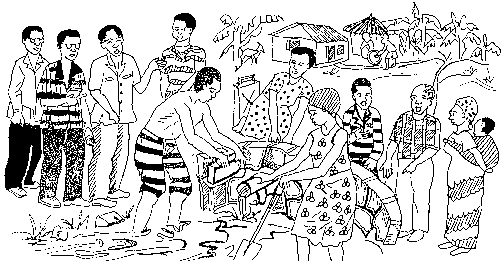Tweet
Translations:
'العربية / Al-ʿarabīyah
Català
中文 / Zhōngwén
Deutsch
English
Español
Filipino/Tagalog
Français
Ελληνικά / Elliniká
हिन्दी / Hindī
Italiano
Polszczyzna
Português
Română
Српски / Srpski
Other formats:
Other Pages:
Modules
Site Map
Key Words
Contact
Utility Documents
Useful Links
Social Research
SURVEY OF EXTERNAL COMMUNITY RESOURCES
What Can the Community Get From Outside?
by Phil Bartle, PhD
Training Handout
Assessing Outside Resources for Community Projects
External Resources:
For a community to become stronger and more self reliant, the more resources that it can obtain from within the community (Internal) then the more it becomes empowered. The danger of contributing to Dependency has been mentioned elsewhere.
If, however, the community can tap outside resources to which it is entitled, then you can guide community members to those resources, so long as you also encourage using internal resources.
To prepare yourself for your mobilizer work, you can research to various outside sources of inputs for community projects. Three legitimate sources for communities include (1) government, at district, then regional then national level, (2) non governmental agencies, including both international and national assistance organizations, and (3) international bilateral and multilateral assistance projects.
There are issues attached to each of these. Governmental sources may be provided along with very rigid regulations and procedures that hinder the empowerment process. NGOs are often charities which encourage dependencies, are sometimes associated with religious or other proselytising, and may not have continuity or national coverage which result in inequities for the whole country. International projects are usually set up for fixed periods of time, and seldom prepare for sustainability and self sustaining empowerment.
There are two major kinds of resources from external resources: (1) financial, such as grants and project monetary support, and (2) expertise that can guide community members in setting up and running their projects.
Governmental Sources:
Visit governmental offices, first at the most local level, eg district offices. From them, get information of what expertise and financial assistance might potentially be available. Try to also get introduction to governmental officers that may be at the next higher level of governmental offices, eg regional or provincial. Do the same there for national officers.
Keep in mind that some ministries and departments have people trained and ready to visit communities, but who lack transport and other expenses. Ask if it would be possible for them to make a community visit if the community were to raise the funds needed to cover such costs. This serves two purposes; (1) it gets the guidance resource to the community and (2) it involves the community in contributing to the process, and therefore valuing that guidance more.
- community development
- eco-tourism
- education
- forestry
- health
- income generation
- irrigation
- literacy
- micro credit
- roads
- sanitation
- social services
- water
Governmental funds may be available through:
- ceding of public funds through decentralisation
- grants available for specific sectors
- loans or credit available through special programmes
Whether you are a governmental mobilizer, or work for a non governmental agency, you need to make a survey of such available governmental resources that the community might tap.
You also need to find out and record the procedures needed by governmental departments for you and your community to apply for financial support.
Non-Governmental Sources:
Non-Governmental sources of finance and technical expertise may include any of the following:
- International NGOs
- National and local NGOs
- Churches and other religious organizations
- Foundations and Trust Funds
- Embassies (High Commissions of Commonwealth countries)
- Bilateral projects
- UN and other multilateral agencies
- Patrons and other private donors
- Urban and overseas associations of community members
Both UN agencies and international NGOs are often sources of various kinds of expertise and are often willing to send specialists to local communities, so long as you do the organizing of the community workshops. Remember that mobilizers, activists, animators and community workers from other agencies are a good resource, and you and they will benefit by making partnerships and working together.
Beware of encouraging community dependency on outside resources. See the document on The Dependency Syndrome. A small portion of funds can come from outside, and may be necessary to complete a community project, but external sources tend to weaken rather than empower a community.
A related training document, Fund Raising, will guide you through the process of leading the community through proposal writing so as to obtain available funds. In your research, here, you first need to know what are the potential sources you can help the community to tap.
If you are part of a district or area mobilization process, and to ensure your successor can begin work without serious disruption, your observations (records of this research) need to be written and available.
––»«––
Ministry Experts Bring Technical Advice:
 |